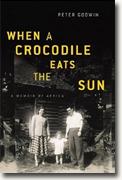When a Crocodile Eats the Sun
Peter Godwin
book reviews:
· general fiction
· chick lit/romance
· sci-fi/fantasy
· graphic novels
· nonfiction
· audio books
· author interviews
· children's books @
curledupkids.com
· DVD reviews @
curledupdvd.com
newsletter
win books
buy online
links
home
for authors
& publishers
for reviewers

 |
When a Crocodile Eats the Sun: A Memoir of Africa Peter Godwin Little, Brown Hardcover 352 pages April 2007 |
|
A variety of books have now chronicled the nature of life in the erstwhile Rhodesia and South Africa both before and after independence (in the case of Rhodesia) and apartheid (in the case of South Africa). In this regard, in a previous book titled Mukiwa, Peter Godwin lucidly delineated the trials and tribulations of growing up as a white boy in the time period just before and after Rhodesia became Zimbabwe in 1980. In this book, Godwin offers a more contemporary perspective on what life has been like and what it continues to be like in Zimbabwe for people in general and for his proximate family in particular.
The author rightly traces the beginning of discontent and the civil war of independence in Rhodesia to the huge disparity in land holdings. We learn that although whites made up only about one per cent of the population, they held more than half the agricultural land. This inequitable state of affairs began to change in post-independence Zimbabwe, first in an orderly and legal manner but degenerating with the passage of time into a disorderly and vindictive manner. Increasingly, Mugabe came to see successful white farmers as disloyal or worse, hence he had no compunction whatsoever in arbitrarily handing over their land to the so called “war veterans,” most of whom had neither the ability nor the inclination for profitable commercial farming. As a result, Zimbabwe went from being the veritable bread basket of Africa to a nation with chronic food shortages. On the family front, too, things are less than savory for the author. His sister has to leave Zimbabwe for spurious security reasons, his mother undergoes a traumatic hip replacement surgery, and his father’s health begins its slow but inexorable decline. What is remarkable about these events is not necessarily that they have occurred but the extreme deprivation, the breakdown of civic institutions, and the near total lack of hope in contemporary Zimbabwe that have allowed these and other related events to gradually spiral out of control. Along these lines, the author is persuasive when he claims that the odious President Mugabe has turned ordinary Zimbabweans into scavengers, deprived grown men of their dignity, and left his parents impoverished, alone, and fearful. In this era of globalization, it is commonplace and even possibly trite to point out that we live in an increasingly connected world. However, the power of the germane centripetal forces of globalization notwithstanding, this book perspicaciously points out that the misguided worldviews of individuals like Mugabe can give rise to potent centrifugal forces that diminish welfare not only for the citizens of a nation such as Zimbabwe but also for the broader world community. Second, this book forces the reader to contemplate the thorny question of who is an African and the more general notion of identity. Third, even if one has little prior knowledge about southern Africa, all readers will be able to identify with at least some of the many universalist ideas that are discussed in this book. This book would have been more complete had the author included a “notes” section in which he provided more information about Shona words that he uses, and additional details on the historical and the geographic significance of specific dates and events that he comments on. This caveat notwithstanding, When a Crocodile Eats the Sun Originally published on Curled Up With A Good Book at www.curledup.com. © Amit Batabyal, 2007 |
|
|
|
 Click here to learn more about this month's sponsor! |
|
| fiction · sf/f · comic books · nonfiction · audio newsletter · free book contest · buy books online review index · links · · authors & publishers reviewers |
|
| site by ELBO Computing Resources, Inc. | |
 This saturnine yet compelling book provides an intensely personal account of the decline in the health and the ultimate demise of Godwin’s father and the impact that this has on the close knit but geographically separated Godwin family. At the same time, this book also provides a penetrating account of present-day Zimbabwe under the tyrant Robert Mugabe and its free fall from stability to almost complete chaos.
This saturnine yet compelling book provides an intensely personal account of the decline in the health and the ultimate demise of Godwin’s father and the impact that this has on the close knit but geographically separated Godwin family. At the same time, this book also provides a penetrating account of present-day Zimbabwe under the tyrant Robert Mugabe and its free fall from stability to almost complete chaos.